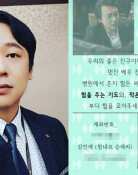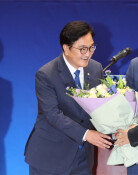Roh Was Media Darling, Now Its Critic
Could I have become the president without the help of the press? said President Roh at the reception celebrating the 30th anniversary of the founding of KBS on March 4, 2003.
These days, egoism in broadcasting companies, employees and labor unions is at the core and there is no suitable way to regulate it, he said at the ceremony for appointing members for the third-term Korean Broadcasting Commission on July 14, 2006.
President Roh Moo-hyuns attitude towards broadcasting is turning cold. His praises at the beginning of his inauguration has changed to direct criticism of the medias collective egoism in three years.
The criticism level of Cheong Wa Dae and government officials is rising also. Regarding the negative view of broadcasting reports on the Korea-U.S. free trade agreement (FTA), Cheong Wa Dae officials criticized, saying, It is biased and distorted reporting, (said by senior presidential secretary for public relation Lee Baek-mahn). In informal occasions, words often come out that the relationship with the press is not running smoothly.
In particular, President Roh made criticism referring to broadcasting companies, the labor union of those companies and members of the broadcasting commission. His recent criticism targets broadcasting reports criticizing the FTA, the backlash against the presidents personnel management rights from a broadcasters labor union (KBS), and terrestrial broadcasters putting a brake on the communication and broadcasting convergence, a commitment made by the president. It eventually led to an overall dissatisfaction on broadcasting.
Is Roh a lame duck president?
Many observations connect the conflict between broadcasting and the government with President Rohs lame duck status. The fact that the front line in which the government and broadcasters are confronting is the FTA, a core task for the second half of President Rohs term in office, lends weight to the analysis.
The broadcasting field says that broadcasting reports related to the FTA seem drastically different from those on the Iraq dispatch during the beginning of the launch of the current government.
At a seminar held by the Citizens Coalition for Democratic Media and the National Union of Media Workers in October 2003, it was pointed out, Seven out of eight reports on the dispatch to Iraq were broadcasted on a supporting premise on the 9:00 p.m. news on KBS. According to an analysis on broadcasting reports of KBS, MBC and SBS on the kidnap-murder of Kim Sun-il at a symposium held by the Peoples Coalition for Media Reform in July, 2004, there were 21 reports on an additional dispatch to Iraq directly related to the death of Kim among the total 325 (from June 21 to June 27), but none of them were critical. This is entirely different from the reports regarding the FTA.
To such changes, an Uri Party lawmaker said, The reported contents and the matter itself is the issue, not lame duck status. Lawmaker Choi Ku-sik of the Grand National Party said, Lame duck status attributes partially to the cause, but the more substantive matter is that broadcasters have grown into an omnipotent dinosaur.
KBS and MBC are critical of government policies -
President Rohs criticism toward broadcasting came after his senior secretary on public relations Lee and Government Information Agency head Kim Chang-ho reproached FTA-related reports by KBS and MBC. Kim said on July 4 that he cannot help but to question the fairness of reports on the FTA and criticized the FTA report broadcast on June 4 on the program KBS Special that it over-reflected the political view of the producer. On MBCs PD Notes, he reproached Isnt it close to tyranny? even before the program was to be broadcasted on July 4. Accordingly, President Roh instructed public relations activities in the country related to the FTA negotiations to be strengthened.
As MBCs PD Notes is expected to broadcast a second special report on FTA on July 18 and make another counterargument, the conflict is expected to deepen even more.
Broadcasters labor union backlash against presidents personnel management rights
President Roh said at the ceremony for appointing members to the Korean Broadcasting Commission on July 14, Criticizing and raising issues should be adjusted to a reasonable level coordinating with a democratic society. This seems to express the presidents dissatisfaction towards the mediaworkers labor union criticism on Cheong Wa Daes personnel changes through favoritism and that this years personnel appointment was the worst in history forfeiting the independency from the political circle and capital and neutrality on broadcasters.
The conflict between the president and labor union has already come to surface through the struggle opposing the reappointment of the KBS president.
Communication and broadcasting convergence and egoism of terrestrial broadcasters
It is difficult to divide broadcasting and communication in reality, and the national system dividing them into two parts does not correspond with the actual condition, pointed out President Roh. This view seems to come from the perception that terrestrial broadcasters are holding back the policies for the communication and broadcasting convergence.
Yeon-Wook Jung Jin-Yeong Lee jyw11@donga.com ecolee@donga.com







